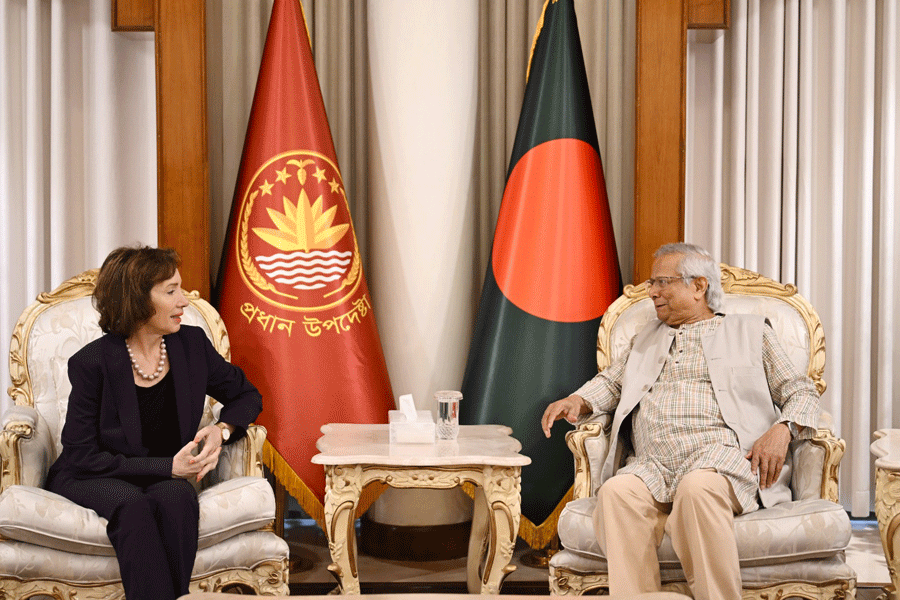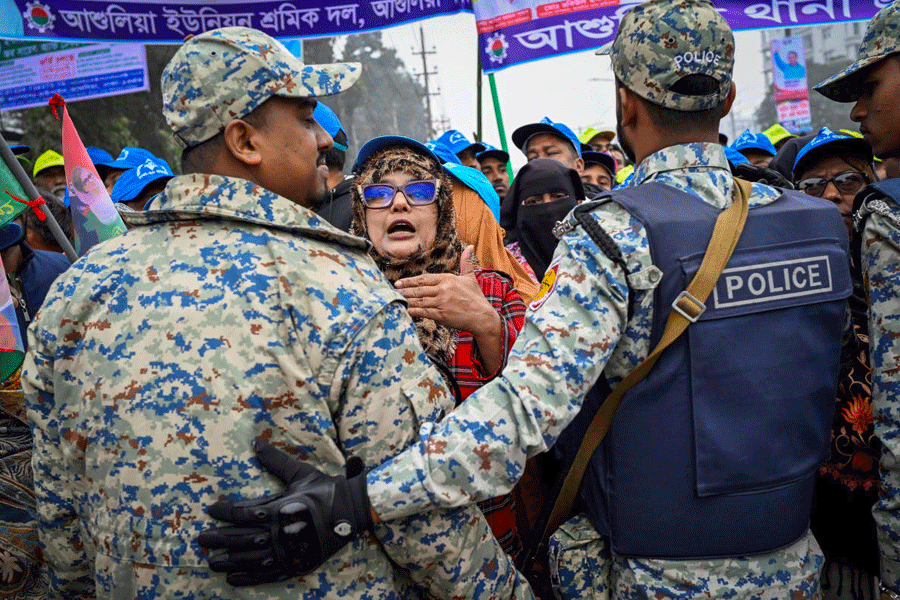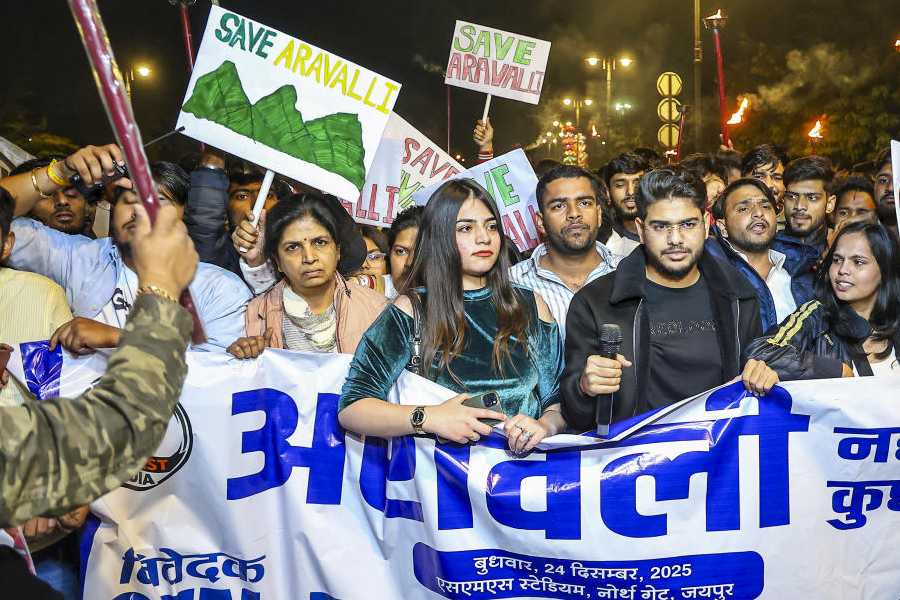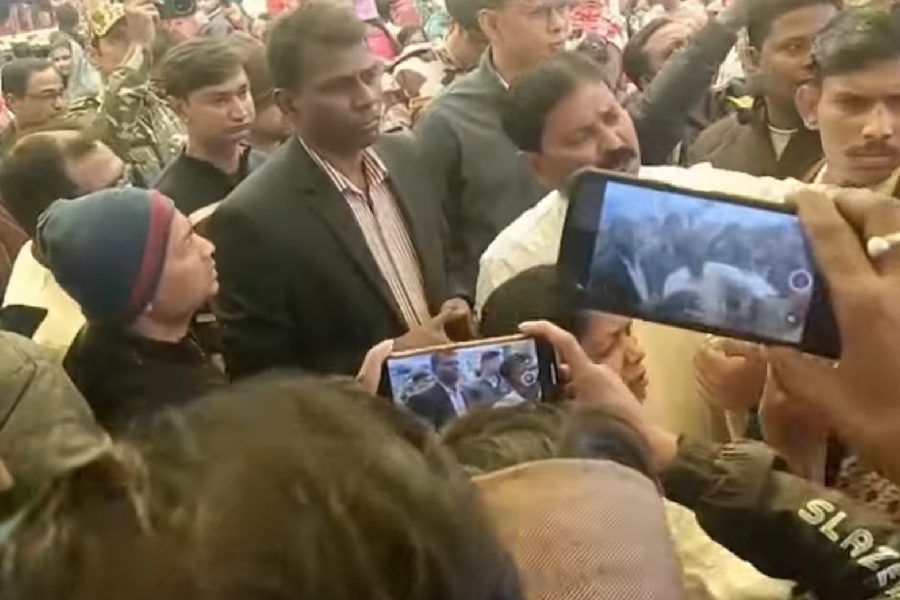 |
| Soumitra Chatterjee in Apur Sansar |
Soumitra Chatterjee agrees that “life is for the living” but 50 years after he made his film debut at the age of 23 in the role that was to define him for the rest of his career — that of Apurba Kumar Roy in Apur Sansar, the final part of Satyajit Ray’s trilogy — Bengal’s premier actor is prepared to face the final curtain.
“I am not afraid of dying,” he says.
Despite reports to the contrary, Soumitra, who has been staying with friends in north London, looks well. But he has to keep taking his tablets, do exercises and go for walks. In London the daffodils, cherry blossom and magnolia are in bloom, so the spring weather makes a pleasant change from being at home in Golf Green in Calcutta.
Since he will turn 75 on January 19 next year, he feels he has to pack in a great deal — plays and poems, for instance, plus TV serials and films, some of them shot in London — in a short space of time. His diet is a bit restricted these days but he would quite like to fit in a nice, juicy steak with some excellent red wine — “prochur wine khabo, prochur” (I shall drink lots of wine, lots).
Speaking in Bengali and English, he has opened up his heart probably as never before.
“Time is very precious, it has become shorter now, I can almost see the end,” he observes.
Not that he is afraid of the “The End”.
“The end is inevitable, you know,” he says. “It is useless to be afraid of it. I am only afraid of physical pain and nothing else. I wonder if at the end I will be able to preserve my dignity. I don’t want to lose my dignity even when I am going away.”
He acknowledges the human spirit is resilient. “No one wants to die. I don’t either but I have learnt to accept that it will come. At some point, life transforms itself into death.”
However, like Mark Twain who corrected reports of his premature passing with the quip — “this report of my death was an exaggeration” — Soumitra, too, for it is best to call him that rather than Chatterjee or Mr Chatterjee, would like to reassure his many friends in Calcutta, who have been very worried about his health, that “by and large, I am ok”.
So what about the unconfirmed reports swirling in two continents that he has come to London for “tests”?
“Yes, I came here for some consultation,” he confirms matter of fact. “I have some prostate trouble — and I have come here to find out in detail what stage that is at and what I need to do. There is nothing that needs to be done immediately except tests from time to time.”
So, he is not undergoing chemotherapy or radiation?
 |
| Soumitra Chatterjee in the north London house where he is staying with friends. Picture by Amit Roy |
“No, not at all,” stresses Soumitra.
In over a month in London he has managed to fit in some sightseeing (a trip to Yorkshire), catch up at home with DVDs (Il Postino, an Italian movie; Behind the Sun, from Brazil; the Czech film Kolya; and The Lives of Others) and take in a play at the National Theatre, Death and the King’s Horsemen, by the Nigerian Wole Soyinka.
He hopes to return to London at the end of the year to make a multicultural film, Ithaca, scripted by friends Amit and Paramita Biswas.
“No chemotherapy or radiation,” he makes it clear. “I came for a consultation with a very good specialist, Dr Anup Patel. He is a urologist and teaches at St Mary’s Hospital in London.”
He realises that he has a special place in the hearts of Bengalis and that any report he is unwell causes concern. “When I had my heart problems, I was flooded with inquiries and messages from wellwishers.”
He has cut down his working day from 10-12 hours to eight but “I am a workaholic”.
Do his fans know the real Soumitra Chatterjee?
After 50 years, “they have their image of me but that may not essentially be me. But I have a question, too, ‘Do I know myself so well?’”
It is an intriguing philosophical question but how would he like to be remembered?
Not apparently as just an actor who gave a lot of pleasure to a lot of people, he says. “Maybe I have been of use to some people on their journey through life. They may have seen one of my movies and (felt), ‘I can fight again.’ I get a lot of letters.”
The man who played Apu concedes that, “it is difficult to go on after you have started your life with a double century. But when you have geniuses like Bradman you have enough inspiration to continue with your creative efforts”.
When Apur Sansar was released in 1959, his friends would gather for adda in a Calcutta coffee house. Convinced there was sweetness in taking a wife, they vowed solemnly: “Now, we must get married.”
He chose not to defect to the Hindi film industry. “There are executives in Calcutta who earn more than me. But to go to Bombay would have meant reorienting my mind which was not possible for me.”
He has seen Pather Panchali 30-40 times. In common with another of his favourites, Vittorio De Sica’s The Bicycle Thief, made in 1948, “they are classics. They transcend time. People will see them as long as there is cinema.”
“As a student of cinema, Pather Panchali is the weakest of Satyajit Ray’s films. It is the second, Aparajito, which is technically perfect. But Pather Panchali has such vitality and life force that I have not seen a human unaffected by it.”
If he could take only a handful of DVDs (or videos) to a mythical desert island from which there was no escape, he could plump for Pather Panchali and Charulata. His life would also not be worth living unless he could take Charlie Chaplin’s 1925 movie, The Gold Rush, as well.
His pick of western classical music would be Vivaldi’s The Four Seasons and Beethoven’s Choral Symphony.
He estimates he has read 8,000 books in his time. His choice for a desert island would be the Mahabharat. He enjoys the current generation of Indian writers in English, but his favourite is Amitav Ghosh, especially The Glass Palace and The Hungry Tide. “It is written in very competent English but I feel it is part of Bengali literature.”
Soumitra, who has been coming to London roughly once a year since his first visit in 1965, says he receives plenty of love and affection from his numerous Bengali friends in the UK.
“But in a big city like London, I get a kind of anonymity,” he says. “No one disturbs me, I am not mobbed, I go untroubled to the theatre. That is difficult for me to do in Calcutta.”
He is also partial to “fish and chips”.
He recalls that on one visit he looked up the house with a blue plaque in Hampstead, north London, where Rabindranath Tagore had stayed. The English woman owner, informed that an actor from India wanted to pay a pilgrimage to the site, scrutinised his face and asked: “Weren’t you in Charulata and in Teen Kanya (Three Daughters)?”
Asked by Soumitra about the framed portrait of Tagore on her wall, she happily revealed she had cut out the picture from a book she had received on moving into the house — the first translation in English of Gitanjali published by Macmillan.
Though he himself did not go to an English medium school and hence was not taught Shakespeare, he had wanted “to do something with” Hamlet in his youth. Now, the prospect of doing something with King Lear “hovers in front of me like a dream”. He does not think much of Mulayam Singh Yadav’s manifesto commitment to ban English — “is he mad or what?”
He says the West Bengal government is reasonably friendly towards the arts but he wants it to do much more along the lines of the publicly-supported Arts Council of England. He wants Bengali society to retain the best of the old culture but press ahead with technical and industrial progress. “There should be a synthesis, a via media. We should not ape states like Gujarat. The yardstick should be humanistic. I have great faith in the future.”
This Soumitra in 2009 is “basically” not that different from that Soumitra of half a century ago. But the youth of 23, he points out, “was very immature and very romantic. He did not know the practical aspect of earning money. He was a bloody fool.”
“Inside, though,” the veteran actor reflects, “that young boy has remained the same. He did not want to live a life without art, not then, not now.”
 |
| Soumitra in London. (Amit Roy) |
MOVIES ON AN ISLAND
- Pather Panchali
- Charulata
- The Gold Rush
MUSIC ON AN ISLAND
- Vivaldi’s The Four seasons and
- Beethoven’s Choral symphony
BOOK ON AN ISLAND
- The Mahabharat
- (He also loves Amitav Ghosh’s The glass palace & the hungry tide)
 |
Soumitra on Sharmila:
Though Soumitra meets Sharmila Tagore only intermittently, he has retained a “solid friendship” with his schoolgirl co-star from Apur Sansar. “Maybe she will come to Calcutta once in six months, ‘What are you doing?’. I would ring her if I am in Delhi, ‘You eat here tonight’. She is interesting and
intelligent and has maintained herself well.” He jokes she is not that interested in cricket but has picked up enough jargon through osmosis. “For the wife of the Nawab of Pataudi, it is part of the package.”
Films HE FINISHED: Suman Ghosh’s Dwando (set to release in July). Somnath Sen’s Swartho (with Madhabi Mukherjee) is in post-production.
Films he couldn’t do: Sangeeta Datta’s Life Goes On in London was scripted with Soumitra in mind (now replaced by Girish Karnad). Raja Sen’s Teen Murti (replaced by Dipankar De).
Films on hold: First-time director Sushanto Pal Chowdhury’s Tumi Mor Priya Re and Hridoyer E Kul O Kul. “Soumitrada has agreed to do both films when he comes back from London,” says Pal Chowdhury.










